| 18 January |
• yesterday • tomorrow |

• Andrés Gregho
• Andrés of Peschiera
• Andrew...
• Apostle of the Valtellina
Raised in a pious family, Andrés grew up on the shore of Lake Garda in Italy. He early felt a desire to become a hermit, and tried living in monastic style at his father‘s home. When his father died, the 15 year old Andrew joined the Dominicans at the priory at Brescia, Italy. Studied at the San Marco monastery in Florence, Italy with Saint Antoninus of Florence, Blessed Lawrence of Riprafratta, Blessed Constantius of Fabriano, and Blessed Antony della Chiesa. Priest. Travelling preacher in the Valtellina region of Italy, and the areas of Switzerland where the Albigensian heresy had taken root; he worked in the area for 45 years, travelling the mountains on foot, staying with the poor, staying where he could, hiding from bandits and heretics, living off whatever came to hand. Among the parishes, churches, hospitals, schools, orphanages and monasteries he founded was the convent at Morbegno, Italy which became a base of operations for Dominicans trying to bring the people back to orthodox Christianity, and where Andrés retired to spend his final years as a prayerful monk.
1400 in Peschiera del Garda, Italy
• 18 January 1485 in the Dominican convent at Morbegno, Sondrio, Lombardy, Italy of natural causes
• buried at the parish church in Morbegno
• miracles reported at his tomb
• the number of pilgrims who came to it caused the friars to relocate his relics twice, each time to a place with easier access
26 September 1820 by Pope Pius VII (cultus confirmation)
book with a snake emerging from the pages; it refers to a report of a miracle in which Albegensian heretics brought Andrés a book that they said would explain their beliefs; he told them to open it; a serpent emerged from the pages, the heretics saw the error of their ways, and converted back to orthodox Christianity
An obedient religious is a holy religious. – Blessed Andrés
https://catholicsaints.info/blessed-andres-de-peschiera-grego/

Taught catechetism to children. She grew to love Augustinian spirituality, and became acquainted with the human and spiritual adventure of Rita of Cascia, whose canonization in 1900 was very special to Maria, leading to her desire to be an Augustinian religious in the monastery of Cascia, Italy. She entered in June 1906 at age 25, made her initial vows on Christmas 1907, taking the name Maria Teresa.
The community was in sad decline when Maria Teresa entered, and she became disillusioned. In 1911, she stayed her family for a period of reflection, but returned to the convent, taking her solemn vows on 22 March 1912. Novice mistress in 1914. After writing letters about the terrible spiritual condition of the community, she was appointed vicar from 1917 to 1920, and abbess from 1920 till her death in 1947.
The little chapel containing Saint Rita's body was almost unknown when Mother Maria entered the monastery. Today the basilica is a place of pilgrimage for thousands who learned of Rita through the pamphlet, Dalle Api alle Rose, which Mother Maria started in 1923. Mother Maria's dream was to bring people to God through Saint Rita - and it has worked.
The monastery took in orphan girls, and many live in the modern "Saint Rita's Hive" next to the church. An Augustinian seminary, a hospital, retreat house, and other services grew up around the chapel. Mother Maria Teresa's love was the cause of it all, her spirit sustaining her frail body through the years and work.
27 December 1881 at Torriglia, Genoa, Italy as Maria Fasce
• 18 January 1947 of natural causes
• buried next to Saint Rita of Cascia
12 October 1997 by Pope John Paul II
I love him even if it costs much, I love him because it is worth much, I love him at all cost. - Mother Maria Teresa
I am leaving this world with faith, hope and love! I hope to find you there…where God reigns and where we will live for ever. - Mother Maria Teresa
https://catholicsaints.info/blessed-maria-teresa-fasce/
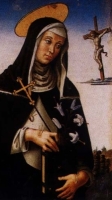
Marguerite
Daughter of King Bela IV of Hungary and Marie Laskaris; grand-daughter of the Byzantine emperor. When Hungary was freed from the Tatars, her parents had pledged their next child to God. To keep this promise, Margaret was placed in a Dominican convent at Veszprem, Hungary at age 3; Blessed Helen of Hungary served as her novice mistress. She transferred at age ten to the convent of the Blessed Virgin founded by her parents on the Hasen Insel near Buda, where she lived the rest of her life. At one point her father arranged a marriage for her to King Ottokar II of Bohemia, but she adamently refused. She took vows at age 18. Known for severe self-imposed penances, and for kindness to those of lower social station. The investigation for her canonization lists 27 miracles including healings and a case of awakening from death.
1242
• 18 January 1271 at Budapest, Hungary
• relics given to the Poor Clares at Pozsony (modern Bratislava, Slovak Republic) when the Dominican Order in the area was dissolved
• most of her relics were destroyed in 1789, but some are still preserved at Gran, Gyor, Pannonhalma, Hungary
19 November 1943 by Pope Pius XII
against flood
• Dominican holding a lily and a book
• princess with a lily
• Dominican in prayer with a globe of fire over her head
https://catholicsaints.info/saint-margaret-of-hungary/

• Christina of Aquila
• Matthia Ciccarelli
Youngest of six children of Domenico de Pericolo. Drawn to the religious life from an early age. Augustinian recluse at the monastery of Saint Lucia in Aquileia, Italy in June 1505, taking the name Christina. Abbess. Prophet, healer, and visionary, noted for her piety, humility, generosity to the poor, and ecstasies; sought after as a spiritual director by people from all walks of life. On the feast of Corpus Christi, Christina was seen to levitate, and the image of a Host in a golden pyx radiated from her breast. A vision on Good Friday caused invisible stigmata and the pains of Crucifixion until the next day.
24 February 1481 at Luco, Abruzzi, Italy as Matthia Ciccarelli
• 18 January 1543 at Aquileia, Italy of natural causes
• buried at the church in the monastery of Saint Lucia just to the right of the altar
1841 by Pope Gregory XVI (cultus confirmed)
https://catholicsaints.info/blessed-christina-ciccarelli/

Deel, Deicolus, Deille, Delle, Desle, Dichul, Diey, Deicuil, Dicuil
Older brother of Saint Gall. Monk. Studied at Bangor Abbey under Saint Comgall of Bangor and Saint Columba. Evangelized in Austrasia and Burgundy in 567. One of the twelve who accompanied Saint Columba to France and helped found the abbey of Luxeuil. When Saint Columba was exiled by Thierry II, Deicola, too old to accompany him, founded the monastery of Lure in the Vosges, France. He then retired to the monastery as a hermit.
in Leinster, Ireland
625 at Vosges, France of natural causes
• hermit with a wild boar at his feet
• hermit with a ray of light shining on him
• with King Clothair
https://catholicsaints.info/saint-deicola/
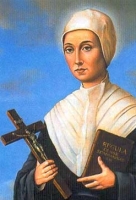
Born to a wealthy familiy, at age 19 she gave it all up to live in community with like-minded friends and work with the sick and the poor. This was the foundation of the Sisters of Saint Catherine, Virgin and Martyr which expanded its mission to educating the young. The Sisters continue their work today with 120 communities in Europe, Africa and South America.
1552 in Braniewo (Braunsberg), Warminsko-Mazurskie, Prussia (in modern Poland)
18 January 1613 in Braniewo (Braunsberg), Warminsko-Mazurskie, Prussia (in modern Poland) of natural causes
• 13 June 1999 by Pope John Paul II
• her beatification miracle took place in Brazil
https://catholicsaints.info/blessed-regina-protmann/

Born to the family of the Norman dukes of Apulia, Italy. Daughter of the Marques of Ferrara, Italy. Niece of Blessed Beatrix of Este the Elder. Betrothed to Galeazzo Manfredi of Vicenza, Italy, but just before the wedding he died of wounds received in combat. Beatrix refused to return to her father's home but became a Benedictine nun at San Lazzaro convent near Ferrara. Founded the Benedictine convent of Saint Antony at Ferrara.
1262 of natural causes
• 1774 by Pope Clement XIV (cultus confirmed)
• memorial date set by Pope Pius VI
https://catholicsaints.info/blessed-beatrix-of-este-the-younger/
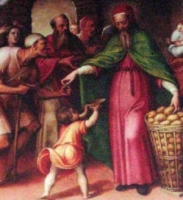
Facio, Facius, Fatius, Fazio, Fazius
An accomplished goldsmith in Verona, Italy, his business opponents developed a vicious hatred for him. He moved to Cremona, Italy, where he worked and gave away his earnings to the poor. Pilgrim to Compostela, Spain, and to Rome, Italy. Returning to his native Verona, he was falsely accused by old opponents, arrested, tried and aquitted; he immediately returned to Cremona. Founded the Order of the Holy Spirit at Cremona, an Order charged with the care of pilgrims and the sick.
1190 in Verona, Italy
1272 of natural causes
https://catholicsaints.info/blessed-fazzio-of-verona/

Child of the diocese of Quiché, Guatemala. He was member of Catholic Action, and taught the faith to small children. Abducted, tortured for hours, then murdered by government forces at the age of 12. Martyr.
4 August 1967 in Potrero Viejo, Quiché, Guatemala
1980 in Segundo Centro de la Vega, Zacualpa, Quiché, Guatemala
• 23 April 2021 by Pope Francis
• beatification recognition celebrated in Santa Cruz del Quiché, Guatemala
https://catholicsaints.info/blessed-juan-barrera-mendez/
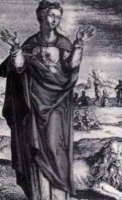
Priscilla, Prisque
Born to the imperial Roman nobility. Supported the Church in Rome, Italy. Martyr.
• stabbed with a sword in 275 in Rome, Italy
• buried in the catacomb of Priscilla on the Via Salaria, Rome, Italy
• relics translated to the nearby church of Saint Prisca on the Aventine Hill, a church she may have helped found
young woman with a one or more lions, an eagle and a sword
https://catholicsaints.info/saint-prisca-of-rome/
Leader of a group of 37 Christian Egyptian noblemen who created and worked in an organization to spread the faith through Egypt. Though there were many converts, the men were attacked, beaten, arrested and abused in various places around the country. The governor of the region had them all arrested, brought to him, and ordered them to make public sacrifices to show they were good citizens. Paul, as their leader, explained that death was better than denial of their faith. Martyr.
https://catholicsaints.info/saint-paul-of-egypt/
2 January as one of the Martyrs of Anjou
Lay woman of the diocese of Angers, France. Martyred in the persecutions of the French Revolution.
c.1745 in Châtillon-sur-Sèvre, Maine-et-Loire, France
18 January 1794 in Avrillé, Maine-et-Loire, France
19 February 1984 by Pope John Paul II at Rome, Italy
https://catholicsaints.info/blessed-felicite-pricet/
2 January as one of the Martyrs of Anjou
Lay woman of the diocese of Angers, France. Martyred in the persecutions of the French Revolution.
1 April 1752 in Chalonnes-sur-Loire, Maine-et-Loire, France
18 January 1794 in Avrillé, Maine-et-Loire, France
19 February 1984 by Pope John Paul II at Rome, Italy
https://catholicsaints.info/blessed-charlotte-lucas/
2 January as one of the Martyrs of Anjou
Lay woman of the diocese of Angers, France. Martyred in the persecutions of the French Revolution.
4 April 1762 in Chalonnes-sur-Loire, Maine-et-Loire, France
18 January 1794 in Avrillé, Maine-et-Loire, France
19 February 1984 by Pope John Paul II at Rome, Italy
https://catholicsaints.info/blessed-monique-pichery/
2 January as one of the Martyrs of Anjou
Lay woman of the diocese of Angers, France. Martyred in the persecutions of the French Revolution.
c.1745 in Châtillon-sur-Sèvre, Deux-Sèvres France
18 January 1794 in Avrillé, Maine-et-Loire, France
19 February 1984 by Pope John Paul II at Rome, Italy
https://catholicsaints.info/blessed-victoire-gusteau/

Young girl who fled to Nola, Italy to escape persecution. Arrested there for her faith, she was taken to Salerno, Italy, tortured and martyred with Saint Thecla and Saint Archelais.
at Romagna, Italy
beheaded in 293 at Salerno, Italy
lily (Susanna)
https://catholicsaints.info/saint-susanna-the-martyr/

Young girl who fled to Nola, Italy to escape persecution. Arrested there for her faith, she was taken to Salerno, Italy, tortured and martyred with Saint Thecla and Saint Susanna.
at Romagna, Italy
beheaded in 293 at Salerno, Italy
https://catholicsaints.info/saint-archelais-the-martyr/

Young girl who fled to Nola, Italy, to escape persecution. Arrested there for her faith, she was taken to Salerno, tortured and martyred with Saint Archelais and Saint Susanna.
at Romagna, Italy
beheaded in 293 at Salerno, Italy
https://catholicsaints.info/saint-thecla-the-martyr/
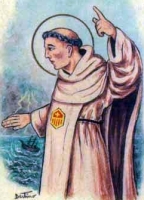
One of the first Mercedarian friars to join the order, he served as assistant to Saint Peter Nolasco. Worked in the area of Majorca, Spain. Miracle worker, he is reputed to be able to calm the seas by prayer.
Barcelona, Spain of natural causes
https://catholicsaints.info/blessed-juan-de-laers/
• Ulfrid of Sverige
• Wilfrid, Wolfred, Wolfried, Wulfrad, Wulfrid
Missionary bishop to Germany and Sweden. Martyred for chopping down an idol of the god Thor.
10th century England
• 18 January 1028 by Norse pagans
• body thrown into a marsh
https://catholicsaints.info/saint-ulfrid-of-sweden/
Volusianus
As a layman, he suffered through years of a terrible marriage. Imperial Roman senator at Tours, France. Bishop of Tours in 488. Exiled to Spain in 496 by Arian Visigoths. May have been martyred, but records are unclear.
496 at Toulouse, France
https://catholicsaints.info/saint-volusian-of-tours/
One of a group of eight missionaries who worked in eastern Egypt. They were sufficiently successful that they were arrested and murdered for being "disturbers of public order"; only Agathius's name has come down to us. Martyr.
burned at the stake in eastern Egypt
https://catholicsaints.info/saint-agathius-the-martyr/
Bishop in North Africa. Attended the Council of Carthage in 259. Martyred in the persecutions of Decius.
259 in Carthage, North Africa (modern Tunis, Tunisia)
https://catholicsaints.info/saint-lucius-of-carthage-18-january/
Bishop in North Africa. Attended the Council of Carthage in 259. Martyred in the persecutions of Decius.
259 in Carthage, North Africa (modern Tunis, Tunisia)
https://catholicsaints.info/saint-lucius-of-paul-18-january/
Bishop in North Africa. Attended the Council of Carthage in 259. Martyred in the persecutions of Decius.
259 in Carthage, North Africa (modern Tunis, Tunisia)
https://catholicsaints.info/saint-success-of-carthage/
Soldier. Arrested with Saint Moseus for the crime of hiring and supporting Christians during the persecutions of Decius. Condemned to labour in the mines of Bithynia. Martyr.
burned to death in 250
https://catholicsaints.info/saint-ammonius/
Soldier. Arrested with Saint Ammonius for the crime of hiring and supporting Christians during the persecutions of Decius. Condemned to labour in the mines of Bithynia. Martyr.
burned to death in 250
https://catholicsaints.info/saint-moseus/
Melanippi, Melanippo, Melanuhfôs, Meliufos
Martyr.
3rd century Nicaea, Bithynia (in modern Turkey)
https://catholicsaints.info/saint-melanippus-of-nicaea/
Cosconi, Cosconio, Cosconium
Martyr.
3rd century Nicaea, Bithynia (in modern Turkey)
https://catholicsaints.info/saint-cosconius-of-nicaea/
Priest. Hymnist. Martyr.
burned at the stake in 196 in Pontus, Asia Minor
https://catholicsaints.info/saint-athenogenes-of-pontus/
Zenone, Zenonis
Martyr.
3rd century Nicaea, Bithynia (in modern Turkey)
https://catholicsaints.info/saint-zeno-of-nicaea/
Dye
A church near Redruth, Cornwall, England is named for him. No information about him has survived.
https://catholicsaints.info/saint-day/
Second century martyr.
in Numidia
https://catholicsaints.info/saint-catus/
CatholicSaints.Info Portable Edition